Where Is Turkey on the Map
Turkey is a nation that straddles two continents: Europe and Asia. Its unique geographical location places it at the crossroads of eastern Europe, western Asia, the Middle East, and the eastern Mediterranean. In this blog, we will explore Turkey's precise location, its borders, and other essential information regarding where it lies on the map.
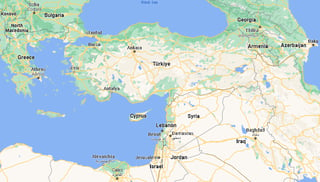
Geographical Borders
Turkey shares its borders with various neighboring countries and bodies of water:
- To the north, it borders the Black Sea, providing access to countries like Bulgaria, Romania, Ukraine, and Russia.
- To the northeast, it shares borders with Georgia, Armenia, and Azerbaijan.
- To the east, it is bordered by Iran and Iraq.
- To the south, Turkey has a border with Syria, and it enjoys a long coastline along the Mediterranean Sea.
- To the west, it shares a border with Greece and Bulgaria.
- Additionally, Turkey has coastal access to the Aegean Sea in the west and the Sea of Marmara in the northwest.
Proximity to Major Cities
For travelers looking to gauge Turkey's location in relation to major cities around the world, here are approximate flight times from various cities to popular Turkish destinations:
- Berlin, Germany: A 2.5-hour flight to the southeast.
- Moscow, Russia: A 3-hour flight to the south.
- London, United Kingdom: A nearly 4-hour flight to the southeast.
- New York City, United States: An 11-hour flight to the east.
- Shanghai, China: A 14-hour flight to the west.
Entry Points
Turkey boasts several international airports, with Istanbul being a major aviation hub. Istanbul alone has two international airports: Istanbul Airport and Sabiha Gökçen International Airport. Other popular airports for international travelers include those in Antalya, Dalaman, and Izmir.
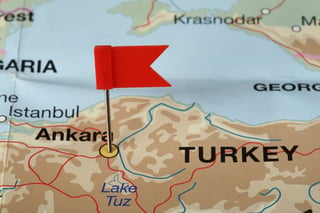
Travelers can also enter Turkey by land, with numerous border crossings to neighboring countries like Greece, Bulgaria, Georgia, Iran, and more. However, entry from Armenia, Syria, and Iraq is currently restricted.
Is Turkey in Europe?
Turkey's location can be a bit perplexing, as it straddles both Europe and Asia. While it shares borders with European countries, such as Greece and Bulgaria, only around 5 percent of its landmass is located in Europe. This European region of Turkey is known as Thrace, which is situated on the Balkan Peninsula, bordering Bulgaria and Greece.
The city of Istanbul, Turkey's largest city, sits at the heart of this geographical conundrum. It spans both Europe and Asia, with the Bosphorus Strait serving as the natural boundary between the two continents.
Is Turkey Part of the EU?
Despite its partial presence in Europe, Turkey is not a member of the European Union (EU) as of 2020. While it has sought EU membership for years, negotiations have not yet led to full integration. Travelers from EU countries may still need to apply for a Turkish visa.
Is Turkey in Asia?
The majority of Turkey's landmass, approximately 95 percent, is situated in the Asian continent. This Asian part of Turkey is known as Anatolia. The narrow strip of land separating Anatolia from Thrace is bordered by the Aegean Sea and the Black Sea.
While Turkey's political identity aligns with Europe and the West, being a member of NATO and an ally of Western nations, its unique geographical position makes it a bridge between Asia and Europe.
Capital City
Ankara serves as the capital of the Turkish Republic. Despite not being the largest city in Turkey, Ankara is the center of government and industry. It has held the status of the capital since 1923, when the nation became a republic, replacing Istanbul (formerly Constantinople) as the capital.
Ankara's strategic location at the intersection of important roads and railways makes it a significant point for domestic and international trade.
Important Cities in Turkey
Turkey is a diverse and culturally rich country, boasting a wide array of cities that offer unique experiences for travelers. From bustling metropolises to charming coastal towns, here are some of the most important cities in Turkey:
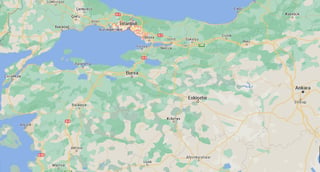
Istanbul
Location: Northwestern Turkey, straddling Europe and Asia
Istanbul is Turkey's most iconic and populous city, serving as a bridge between two continents. It is a vibrant metropolis that blends history and modernity seamlessly. Visitors can explore world-famous landmarks such as the Hagia Sophia, Blue Mosque, and Topkapi Palace, shop in bustling bazaars like the Grand Bazaar, and savor delicious Turkish cuisine along the Bosphorus.
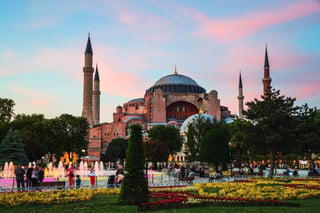
Ankara
Location: Central Turkey
Ankara is the capital city of Turkey and a hub of government and industry. While not as famous as Istanbul, it offers a unique charm with its historic sites, including the Atatürk Mausoleum, and a burgeoning cultural scene. Ankara is also known for its strategic location in the heart of the country.
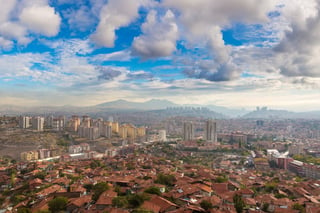
İzmir
Location: Western Turkey, on the Aegean Sea
İzmir is Turkey's third-largest city and a coastal gem known for its relaxed lifestyle and vibrant culture. Visitors can explore ancient ruins at Ephesus, relax on the beautiful beaches of Çeşme, and enjoy the lively atmosphere of the Kemeraltı Bazaar. The city is a gateway to the stunning Aegean region.
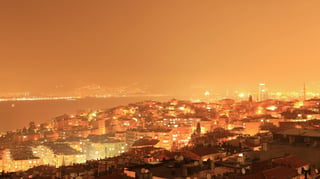
Antalya
Location: Southern Turkey, on the Mediterranean Sea
Antalya is Turkey's largest sea resort and a popular destination on the Mediterranean coast. Known as the "Turquoise Coast," it offers breathtaking beaches, historic sites like Hadrian's Gate, and a thriving tourism industry. Antalya is perfect for beach lovers and those seeking a blend of natural beauty and culture.
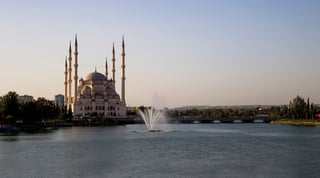
Adana
Location: Southern Turkey
Adana is a dynamic city in southern Turkey known for its economic development. It's a bustling hub with modern shopping centers and industrial areas. Visitors should not miss the opportunity to savor the famous Adana kebab, a local culinary specialty.
Alt tag: Adana / Turkey, Sabanci Central Mosque view.
Alternatives - Göynük, Amasya, and Uzungöl
Turkey is not just about its major cities. If you prefer a slower pace of life and want to explore charming villages and towns, consider destinations like:
- Göynük: A mountain town offering dramatic landscapes and outdoor adventures.
- Amasya: Known for its picturesque setting along the Yesilırmak River and historical charm.
- Uzungöl: A tranquil lakeside village surrounded by lush greenery in the northeast.
These alternatives provide a glimpse into the more relaxed and authentic side of Turkish life, away from the hustle and bustle of major cities.
Whether you're drawn to the cosmopolitan allure of Istanbul, the historical significance of Ankara, the coastal beauty of İzmir and Antalya, or the local flavors of Adana, Turkey's cities offer a wide range of experiences for every traveler.
What Are the Provinces of Turkey?
Turkey is divided into 81 provinces. Here is a list of all the provinces in Turkey:
|
Region |
Province |
|
Marmara |
Adana |
|
Adıyaman |
|
|
Afyonkarahisar |
|
|
Ağrı |
|
|
Amasya |
|
|
Ankara |
|
|
Antalya |
|
|
Artvin |
|
|
Aydın |
|
|
Balıkesir |
|
|
Bilecik |
|
|
Bingöl |
|
|
Bitlis |
|
|
Bolu |
|
|
Burdur |
|
|
Bursa |
|
|
Aegean |
Çanakkale |
|
Çankırı |
|
|
Çorum |
|
|
Denizli |
|
|
Diyarbakır |
|
|
Edirne |
|
|
Elazığ |
|
|
Erzincan |
|
|
Erzurum |
|
|
Eskişehir |
|
|
Black Sea Region |
Gaziantep |
|
Giresun |
|
|
Gümüşhane |
|
|
Hakkâri |
|
|
Hatay |
|
|
Central Anatolia |
Isparta |
|
Mersin |
|
|
Istanbul |
|
|
İzmir |
|
|
Mediterranean Region |
Kars |
|
Kastamonu |
|
|
Kayseri |
|
|
Kırklareli |
|
|
Kırşehir |
|
|
Kocaeli |
|
|
Konya |
|
|
East Anatolia |
Kütahya |
|
Malatya |
|
|
Manisa |
|
|
Kahramanmaraş |
|
|
Southeast Anatolia |
Mardin |
|
Muğla |
|
|
Muş |
|
|
Nevşehir |
|
|
Niğde |
|
|
Ordu |
|
|
** |
Rize |
|
Samsun |
Sakarya |
|
Sinop |
Sivas |
|
Tunceli |
Tekirdağ |
|
Şanlıurfa |
Tokat |
|
Uşak |
Trabzon |
|
Van |
Tunceli |
|
Yozgat |
Şanlıurfa |
|
Zonguldak |
Uşak |
|
Aksaray |
Van |
|
Bayburt |
Yozgat |
|
Karaman |
Zonguldak |
|
Kırıkkale |
Aksaray |
|
Batman |
Bayburt |
|
Şırnak |
Karaman |
|
Bartın |
Kırıkkale |
|
Ardahan |
Batman |
|
Iğdır |
Şırnak |
|
Yalova |
Bartın |
|
Karabük |
Ardahan |
|
Kilis |
Iğdır |
|
Osmaniye |
Yalova |
|
Düzce |
Karabük |
Istanbul's Location
Istanbul, Turkey's largest city, is located in the northwestern corner of the country, within the Marmara region. It straddles the border between Europe and Asia, with the Bosphorus Strait separating the two continents. To the north lies the Black Sea, while to the south lies the Aegean Sea.
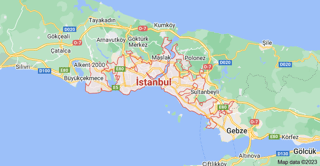
Country Codes and Size
- The International Organization for Standardization (ISO) code for Turkey is "TR," and the United Nations (UN) code is "TUR" or "792."
- Turkey covers approximately 783,562 square kilometers (302,535 square miles), making it the 37th largest country in the world.
- It boasts over 7,200 kilometers of coastline, more than 200 percent larger than the United Kingdom.
What Is Turkey Famous For?
Turkey is renowned for several aspects, including:
- Culinary delights like kebabs, baklava, Turkish tea, and coffee.
- Vibrant bazaars offering handmade products like carpets, ceramics, and lamps.
- Its unique geographical location straddling two continents.
- UNESCO World Heritage mosques and historic sites.
- Natural wonders such as Cappadocia's rock formations and Pamukkale's thermal springs.
- Traditional Turkish baths are known as Hammams.
Historical Names
- The name "Turkey" comes from the medieval Latin name "Turchia" or "Turquia," referring to the land of the Turks who conquered the region in the 11th century.
- Historically, the area was known as the Seljuk Empire, later becoming the Ottoman Empire or Turkish Empire.
- The official name of the country is the "Republic of Turkey."
Population
As of the latest available data, Turkey's population is approximately 84,356,463 people. This makes Turkey one of the most populous countries in the world.
Among Turkey's largest cities:
- Istanbul is the most populous city, with a population of around 14,804,116. It's not only Turkey's largest city but also one of the most populous cities in Europe.
- Ankara, the capital city, has a population of approximately 3,517,182.
In terms of global population rankings, Turkey is among the top 20 most populous countries, currently ranking 17th. It's important to note that Turkey's population has been steadily growing, with a growth rate of approximately 1.09 percent. It is projected that Turkey's population may reach around 90 million by the year 2035.
The Turquoise Coast
The Turquoise Coast, also known as the Turkish Riviera, is a stunning coastal region located in southwestern Turkey. It stretches along the country's Mediterranean and Aegean coasts and encompasses several provinces. Here's more information about its location:
Provinces: The Turquoise Coast covers parts of the following provinces:
- Antalya: This province is a major hub for tourism on the Mediterranean coast and includes cities like Antalya and Alanya.
- Muğla: Muğla is known for its picturesque coastal towns and is home to popular destinations such as Bodrum, Marmaris, and Fethiye.
- Aydın: Aydın is located on the Aegean coast and includes cities like Kuşadası and Didim.
- Southern İzmir: İzmir, a major city on the Aegean coast, is part of the Turquoise Coast region.
- Western Mersin: Mersin is a province on the Mediterranean coast that also contributes to the Turquoise Coast's beauty.
Geography: The Turquoise Coast is renowned for its stunning natural beauty, including crystal-clear turquoise waters, sandy beaches, lush green landscapes, and rugged cliffs. It's a paradise for beach lovers and outdoor enthusiasts.
Historical Sites: In addition to its natural beauty, the Turquoise Coast is rich in history and boasts numerous archaeological sites and ancient cities. Visitors can explore places likeArykanda, Tlos, Xanthos, and the Lycian Way, which is a famous hiking trail that passes through historic ruins.
Activities: The region offers a wide range of activities, including boat tours on traditional Turkish yachts called "gülets," water sports, hiking, and exploring charming coastal towns and villages. It's a popular destination for both relaxation and adventure.
Overall, the Turquoise Coast is a sought-after destination in Turkey, known for its stunning landscapes, historical significance, and a variety of experiences that cater to travelers seeking both relaxation and exploration.
Safety
The safety of any location can vary depending on various factors, including current events and personal circumstances. Turkey, like many other countries, has areas that are generally considered safe for tourists, and there are regions where caution is advisable. Here's some information on safety in Turkey:
- Coastal Areas: Many of Turkey's major coastal areas, especially in the Mediterranean and Aegean regions, are popular tourist destinations and are generally considered safe. Places like Antalya and Fethiye are known for their tourist-friendly environments and are often considered safe for travelers.
- Larger Cities: Cities likeIstanbul and Ankara,while generally safe for tourists, can have common urban issues such as pickpocketing. As with any major city, it's important to exercise the usual precautions, like keeping an eye on your belongings.
- Border Areas: Due to political tensions and security concerns, it's generally not advised to travel near the Syrian border and certain provinces, including Sirnak, Kilis, Hatay, Diyarbakir, Tunceli, and Hakkari. These areas may have specific risks, and it's essential to stay updated on travel advisories before planning any trips near border regions.
While Turkey has experienced increased political and economic stability in recent years and is a popular tourist destination, it's always a good idea to stay informed about the current situation and follow any travel advisories issued by your government. Additionally, practicing common-sense safety measures, like securing your belongings and being aware of your surroundings, can contribute to a safer travel experience.
Electrical Plugs
Yes, round-prong European-style plugs are indeed used in Turkey. These plugs are designed to fit into Type C and Type F electrical outlets, which are the standard socket types in Turkey. Here's some additional information:
- Type C plugs are ungrounded and have two round pins.
- Type F plugs are grounded and have two round pins with the addition of two grounding clips on the sides.
Most European travelers should have no trouble using their devices in Turkey without the need for a voltage adapter, as both Turkey and most European countries use 220-240 volts and 50 Hz. However, it's always wise to check the voltage requirements of your specific electronic devices before plugging them in. Also, carrying a portable battery charger can be helpful, especially during power outages or while traveling.
Travel Insurance
- Travel insurance is essential when visiting Turkey, and some travelers may need it to apply for a Turkish visa.
- While Turkey is not part of the EU, most European travel insurance policies should cover visitors.
Turkey's unique location, rich history, and diverse culture make it a fascinating destination for travelers, offering a blend of European and Asian influences that create a one-of-a-kind experience. Whether you're exploring ancient ruins, savoring Turkish cuisine, or relaxing on the Turquoise Coast, Turkey has something to offer every type of adventurer.
